Harper College Archives
Written By: Madhumitha Manivannan
Facilitated By: Brandi Fialek, Archivist
June 26, 2025
No college experience would be complete without the other essential sights and sounds of a campus: performance! From a blues crooning homecoming dance to a jazz concert by the lake, Harper has offered some of the best events in the region in its nearly 60 year history. Some acts were just finding their feet, or giving it the old non-college try. Others were well established moguls in their field and came to offer their words of wisdom (or lack of them) to the next generation. All of it was made possible with the help of students. This exhibit is dedicated to the the amazing work of the Harper College Program Boards, past and present, who have always been the people "behind the fun." Thank you!
Muddy Waters, often hailed as the "father of modern Chicago blues," was instrumental in transitioning Delta blues into an electrified urban sound. Harper was a fan of Muddy’s music as much as he was a fan of us, as he performed for not only our Homecoming Concert on October 10th, 1978, but also two additional concerts, first on February 21st, 1975, and again November 13th, 1981. The last time he performed at Harper still stands as one of the most attended concerts on campus grounds, after a rumor that the Rolling Stones (who named themselves after his song "Rollin' Stone") were also set to appear alongside him, resulting in thousands coming to the performance – it was so crowded that even the opening act, Big Twist and the Mellow Fellows, got caught up with the traffic!
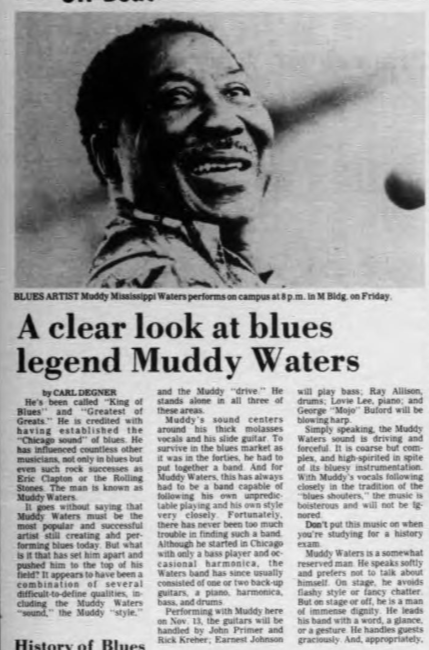
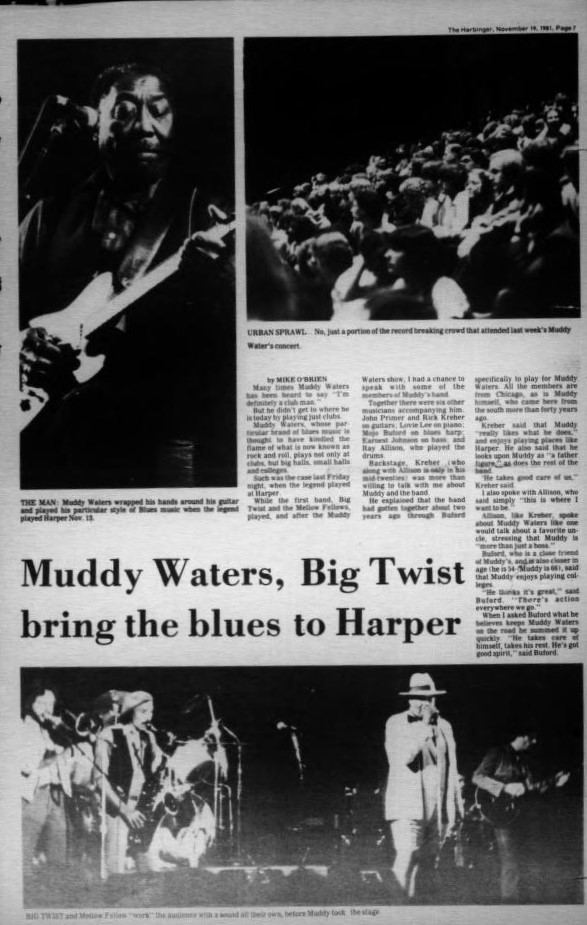
Steve Martin began his career as a stand-up comic with a surreal, offbeat style that stood out in the 1970s. He came around to Harper on March 4th, 1977, during which he charmed the crowd for two and a half hours with his signature banjo act, a bit of juggling, and even wowed the crowd with some magic acts. With the Harbinger, he talks about his inspirations towards his comedy, how he got started, and what keeps his acts so fresh and off-beat.
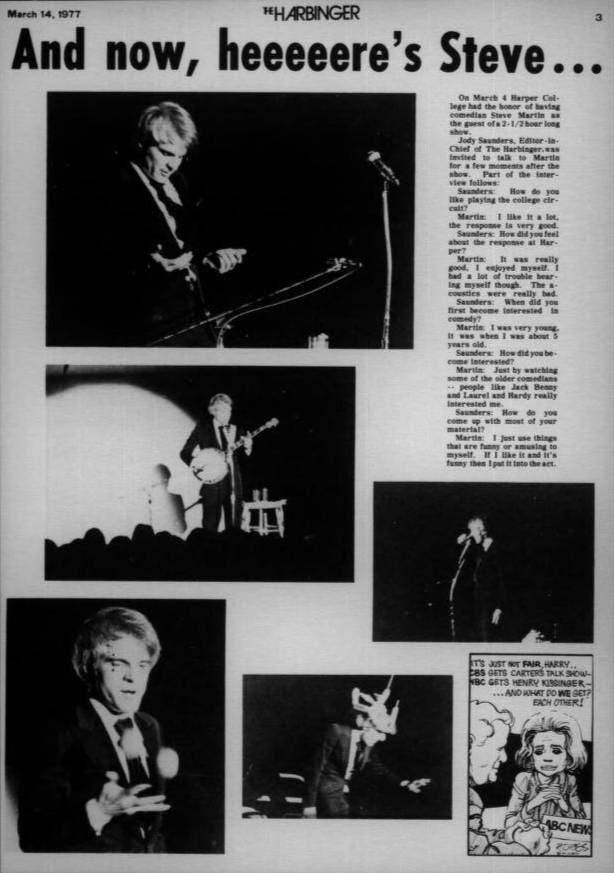
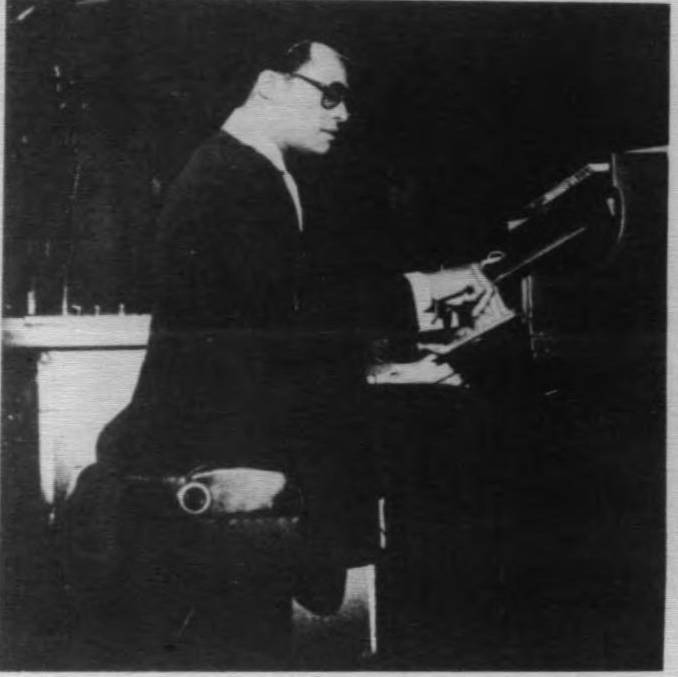
Ramsey Lewis was a celebrated jazz pianist whose blend of gospel, R&B, and classical influences brought jazz to a broader audience. His 1965 hit The "In" Crowd crossed over to pop charts and earned him a Grammy, helping to popularize soul jazz. Throughout his long career, Lewis remained a charismatic performer and a mentor to younger musicians, while also hosting radio shows that celebrated the richness of jazz music.
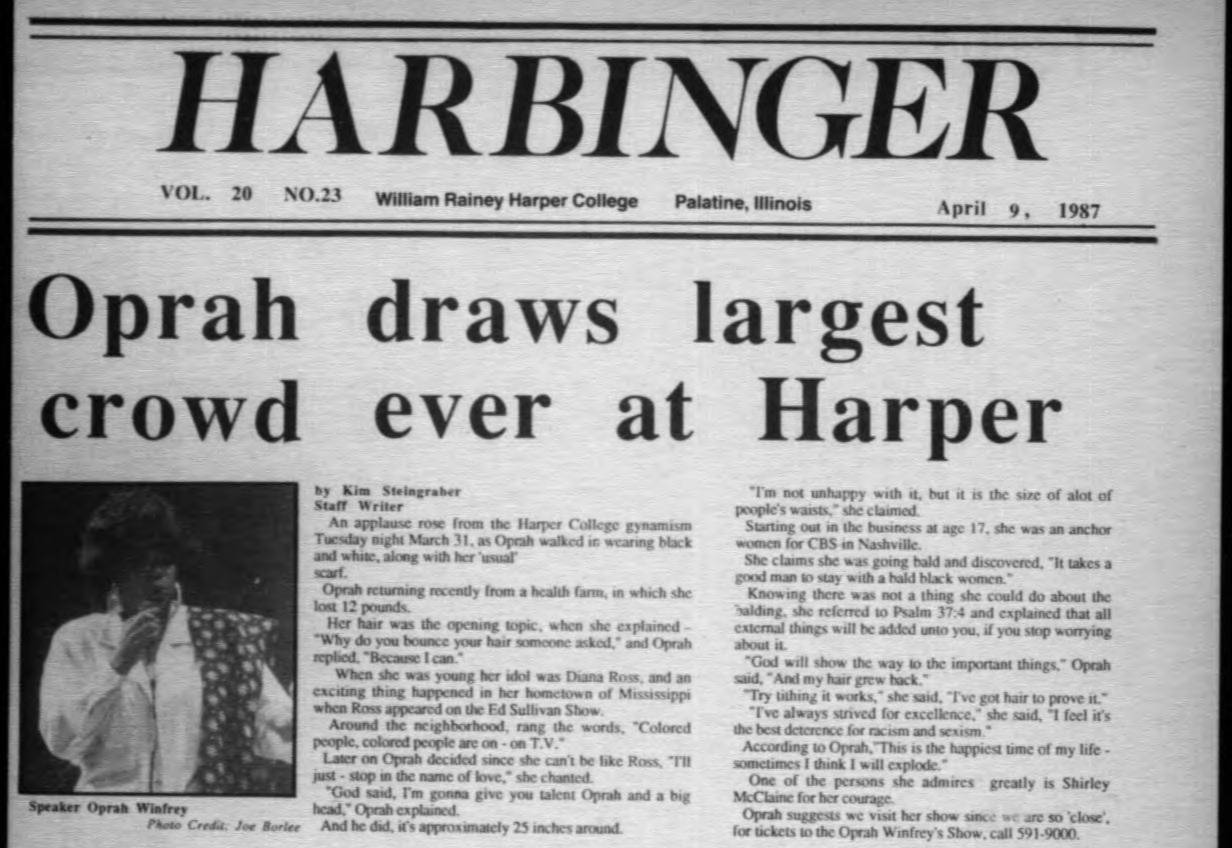
Oprah Winfrey is a media titan whose influence spans television, publishing, film, and philanthropy. With The Oprah Winfrey Show, she transformed daytime talk into a platform for personal empowerment, emotional openness, and cultural dialogue. Oprah infamously missed a White House dinner just to speak at Harper, at a much more reduced fee than she usually charged at the time. When asked why, she said she did so because of her sheer love of local Chicagoans.
Joan Jett and the Blackhearts became icons of punk-infused rock ‘n’ roll with defiant anthems like I Love Rock ’n’ Roll and Bad Reputation. Joan Jett, known for her raspy voice, leather-clad image, and pioneering spirit, broke barriers for women in rock. Backed by the Blackhearts, her raw energy and fierce independence made her a symbol of empowerment and a fixture of the rock scene for decades.
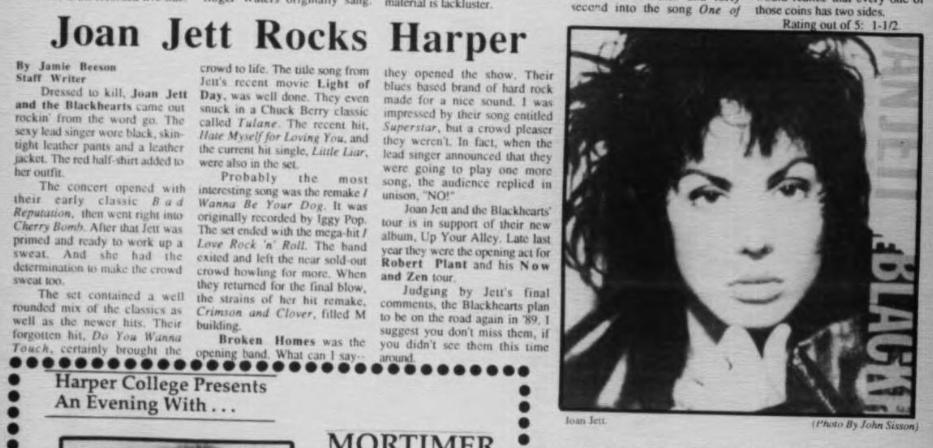
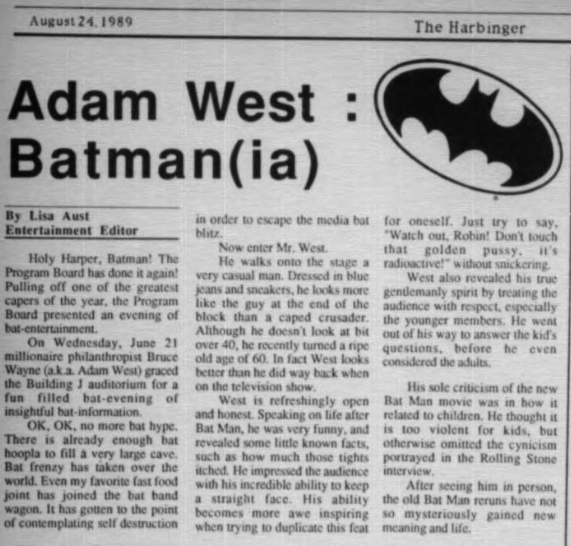
Adam West was an actor best known for portraying the campy, charming version of Batman in the 1960s TV series. With his deadpan delivery and square-jawed heroism, West turned the Caped Crusader into a cultural phenomenon. Adam West was actually at Harper just before Batman (1989) premiered, and a large part of the talk at the time was about his legacy as Batman during the show, and passing on the torch to Michael Keaton (though he was miffed by the darker direction of the Tim Burton directed film).

Buddy Guy is a towering figure in the history of the blues, known for his fiery guitar playing, raw vocal delivery, and electric stage presence. A key link between the blues pioneers and modern rock legends, with a career spanning over six decades, his passionate performances and innovative style have helped keep the blues alive and evolving well into the 21st century. His performance at Harper was recounted to be one of the most engaging moments in Harper's musical history.
Kurt Vonnegut was a literary icon whose satirical and science fiction-infused novels, such as Slaughterhouse-Five and Cat’s Cradle, explored the absurdities of war, technology, and human existence. Vonnegut was well spoken though not a stage performer, Vonnegut's public readings and lectures were engaging, often mixing deadpan humor with deep philosophical insight. His distinct voice—wry, humane, and biting—made him a cherished figure in American literature and culture.
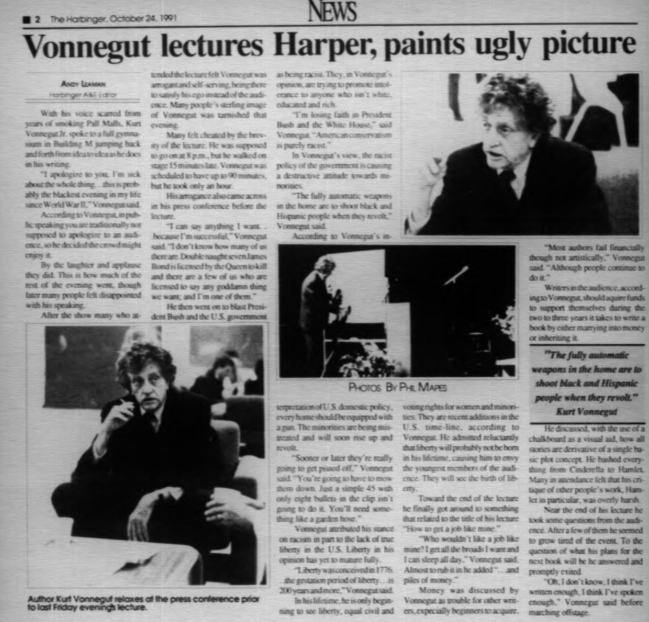
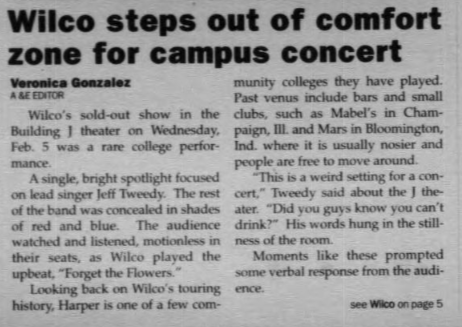
Wilco is an alternative rock band known for their genre-defying sound and introspective songwriting. Formed in the mid-1990s from the ashes of Uncle Tupelo, the band, led by Jeff Tweedy, evolved from alt-country roots into a more experimental direction with albums like Yankee Hotel Foxtrot. They performed at Harper in 1997, a rarity for the group themselves as they didn’t really perform at community colleges. However, the band’s lead, Jeff Tweedy, loved the school so much that he came back as a solo act just two years later.
Further Reading:
The Harbinger Newspaper Collection- Harper College- Accessible via the Internet Archive
Alumni Podcast- Harper Talks Show 12- Michael Nejman
Harbinger “The Paper”, Volumes 1-49 13 September 1967 through 4 May 2015, SC020-HARB Harbinger Newspaper Collection, 1967-2015, Harper College Archives, Palatine, Illinois.
Unarranged/Unprocessed Collection, AC017STA Student Affairs Records, 1968-2009, Harper College Archives, Palatine, Illinois.
William Rainey Harper College. Harbinger Vols. 5-33, 13 September 1971 through 3 May 1999. Harper College Archives, Palatine, Illinois. Internet Archive. https://doi.org/archive.org/details/harbinger[DOIs as follows]:
Harbinger Volume 5 (9/13/1971 - 5/30/1972) DOI: https://archive.org/details/harbinger591319715301972unse
Harbinger Volume 6 (9/11/1972 - 5/29/1973) DOI: https://archive.org/details/harbinger691119725291973unse
Harbinger Volume 7 (9/10/1973 - 6/24/1974) DOI: https://archive.org/details/harbinger791019736241974unse
Harbinger Volume 8 (8/26/1974 - 11/18/1974) DOI: https://archive.org/details/harbinger8826197411181974unse
Harbinger Volume 9 (11/25/1974 – 5/12 1975) DOI: https://archive.org/details/harbinger9112519745121975unse
Harbinger Volume 10 (8/25/1975 - 5/10/1976) DOI: https://archive.org/details/harbinger1082519755101976unse
Harbinger Volume 11 (8/30/1976 - 5/9/1977) DOI: https://archive.org/details/harbinger118301976591977unse
Harbinger Volume 12 (8/22/1977 - 4/24/1978) DOI: https://archive.org/details/harbinger1282219774241978unse
Harbinger Volume 12A (8/21/1978 - 5/7/1979) DOI: https://archive.org/details/harbinger128211978571979unse
Harbinger Volume 13 (10/29/1979 - 5/5/1980) DOI: https://archive.org/details/harbinger1310291979551980unse
Harbinger Volume 13A (8/27/1979 - 10/22/1980) DOI: https://archive.org/details/harbinger13827197910221980unse
Harbinger Volume 14 (8/28/1980 - 5/7/1981) DOI: https://archive.org/details/harbinger148281980571981unse
Harbinger Volume 15 (8/27/1981 - 5/13/1982) DOI: https://archive.org/details/harbinger1582719815131982unse
Harbinger Volume 16 (8/26/1982 - 5/12/1983) DOI: https://archive.org/details/harbinger1682619825121983unse
Harbinger Volume 17 (8/25/1983 - 5/10/1984) DOI: https://archive.org/details/harbinger1782519835101984unse
Harbinger Volume 18 (8/23/1984 - 5/9/1985) DOI: https://archive.org/details/harbinger188231984591985unse
Harbinger Volume 19 (8/29/1985 - 5/8/1986) DOI: https://archive.org/details/harbinger198291985581986unse
Harbinger Volume 20 (9/11/1986 - 5/7/1986) DOI: https://archive.org/details/harbinger209111986571986unse
Harbinger Volume 21 (8/28/1987 - 3/3/1988) DOI: https://archive.org/details/harbinger218281987331988unse
Harbinger Volume 22 (3/10/1988 - 5/5/1988) DOI: https://archive.org/details/harbinger223101988551988unse
Harbinger Volume 23 (Summer 1988 - 5/11/1989) DOI: https://archive.org/details/harbinger2319885111989unse
Harbinger Volume 24 (6/26/1989 - 5/10/1990) DOI:
https://archive.org/details/harbinger2462619895101990unse
Harbinger Volume 25 (6/21/1990 - 5/9/1991) DOI: https://archive.org/details/harbinger256211990591991unse
Harbinger Volume 26 (8/20/1991 - 5/7/1992) DOI: https://archive.org/details/harbinger268201991571992unse
Harbinger Volume 27 (8/27/1992 - 5/14/1993) DOI:
https://archive.org/details/harbinger2782719925141993unse
Harbinger Volume 28 (8/18/1993 - 5/13/1994) DOI: https://archive.org/details/harbinger2881819935131994unse
Harbinger Volume 29 (8/26/1994 - 5/11/1995) DOI: https://archive.org/details/harbinger2982619945111995unse
Harbinger Volume 30 (8/17/1995 - 5/3/1996) DOI: https://archive.org/details/harbinger308171995531996unse
Harbinger Volume 31 (8/26/1996 - 5/5/1997) DOI: https://archive.org/details/harbinger318261996551997unse
Harbinger Volume 32 (8/25/1997 - 5/4/1998) DOI: https://archive.org/details/harbinger328251997541998unse
Harbinger Volume 33 (8/31/1998 - 5/3/1999) DOI: https://archive.org/details/harbinger338311998531999unse
Copyright Harper College Archives ©2025. All Rights Reserved.